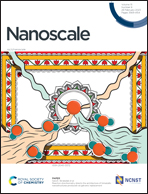Microfluidic fabrication of photo-responsive Ansamitocin P-3 loaded liposomes for the treatment of breast cancer†
Abstract
Ansamitocin P-3 (AP-3) is a promising anticancer agent. However, its low solubility has limited its biomedical applications. The preparation of liposomal formulations for the delivery of low solubility drugs using the microfluidic platform has attracted increasing attention in the pharmaceutical industry. In addition, photodynamic therapy (PDT) is a non-invasive and efficient strategy for the treatment of cancers, making photodynamic liposomes one of the most promising drug delivery systems (DDSs). In this study, a recently developed microfluidic device (swirl mixer) was used for the manufacturing of temperature-sensitive liposomes (TSL) that can be activated by near-infrared stimulation for the treatment of breast cancer. Changing the processing parameters of the microfluidic system allowed for optimizing the properties of the produced liposomes (e.g., particle size and size distribution). For the first time, the anticancer drug AP-3 and the photosensitizer indocyanine green (ICG) were encapsulated into TSL (AP-3/ICG@TSL) during microfluidic processing. The results show that AP-3/ICG@TSL are biocompatible and can significantly reduce the toxicity of AP-3 to normal tissues. After infrared laser irradiation, the heat generated from ICG not only resulted in the cancer cell toxicity, but also facilitated the release of AP-3 in tumor cells. AP-3/ICG@TSL with infrared laser irradiation was found to be able to significantly inhibit the growth of MCF-7 multicellular tumor spheroids (MCTSs) in vitro and MCF-7 tumors subcutaneously inoculated in nude mice as an in vivo model. In addition, it also showed no signs of damage to other organs. The current results demonstrated that the AP-3/ICG@TSL fabricated using the microfluidic swirl mixer is a promising DDS for breast cancer therapy.

- This article is part of the themed collection: 2023 Nanoscale HOT Article Collection


 Please wait while we load your content...
Please wait while we load your content...